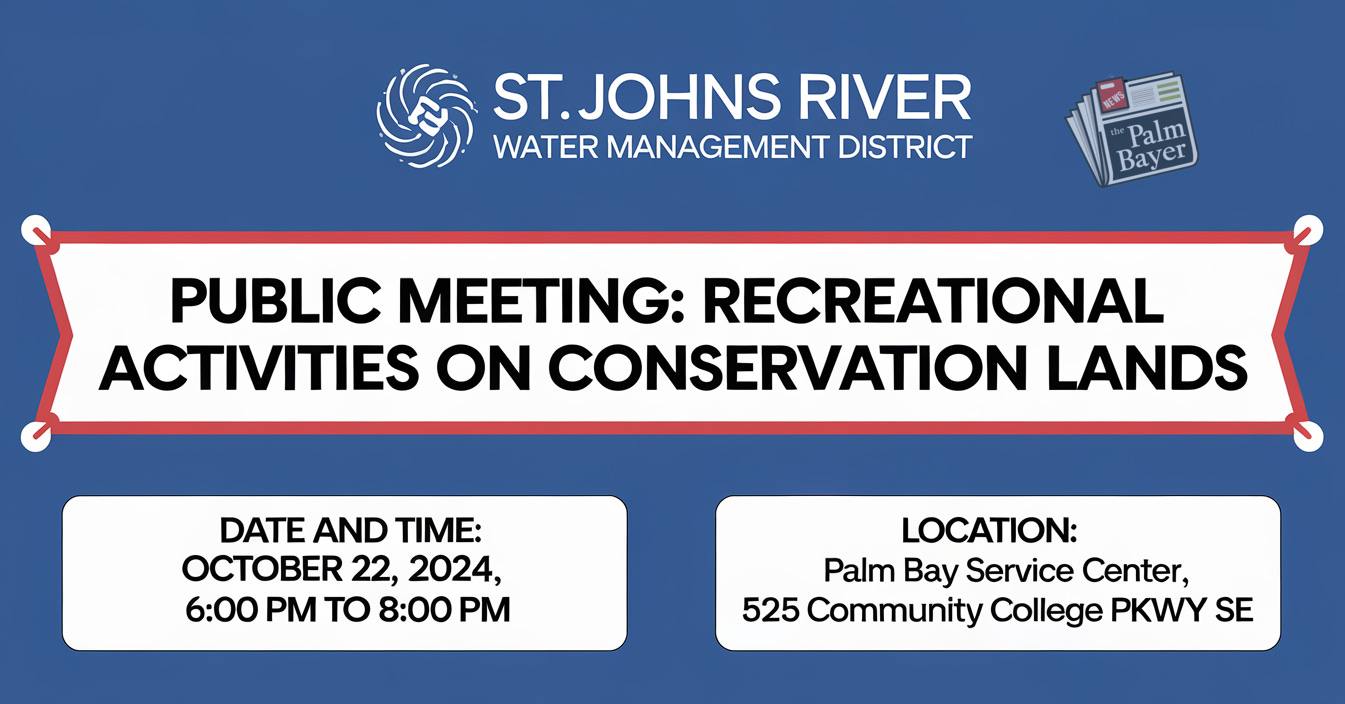St. Johns River Water Management District -Shaping Florida's Conservation Lands
Your Chance to Have a Say in the Future of Recreational Activities in State Parks
Overview
The St. Johns River Water Management District (SJRWMD) is organizing a public meeting to gather input on recreational activities on conservation lands in South Florida. This initiative is part of a broader effort to enhance public engagement and ensure that recreational opportunities are aligned with community needs and environmental sustainability. However, beneath the surface, there are growing concerns about how the outcomes of such meetings may be influenced by private interests and the potential implications for public land use.
Meeting Details
Date and Time: October 22, 2024, from 6:00 PM to 8:00 PM
Location: Palm Bay Service Center, 525 Community College Pkwy SE, Palm Bay, FL 32909
Purpose: To solicit public feedback on the use of conservation lands managed by the district for recreational purposes.
Recent Developments: The Struggle for Florida's Parks
Recent developments have significantly impacted the future of recreational planning in Florida's state parks, revealing a complex dynamic between public interest and private ambitions:
Withdrawal of Golf Course Proposal: The Tuskegee Dunes Foundation has withdrawn its controversial proposal to build golf courses at Jonathan Dickinson State Park. This decision followed intense public opposition, which raised concerns about the environmental damage that such projects could cause. Despite the withdrawal, questions remain about whether these proposals might re-emerge in a different form, potentially reshaped to bypass community resistance.
Suspension of the Great Outdoors Initiative: The Florida Department of Environmental Protection (FDEP) has suspended all proposed development projects under the Great Outdoors Initiative, which included plans for golf courses, pickleball courts, and lodging facilities across various state parks. This suspension came amidst significant scrutiny over the lack of transparency in the planning process and the perceived catering to commercial interests over conservation.
Reasons for Withdrawal: Community vs. Corporate Interests
Public Opposition: The withdrawal of these development proposals did not occur in a vacuum. It was the result of substantial backlash from residents, conservation groups, and lawmakers. Their concerns were rooted in the potential destruction of sensitive ecosystems and the lack of genuine community engagement. Many felt that the original plans prioritized profit over the preservation of public lands, and this sentiment drove an organized resistance that ultimately succeeded.
Government Response: In response to public pressure, Governor Ron DeSantis made it clear that he had not approved the proposed plans and directed FDEP to revisit them. This move suggests a political recalibration, with leaders taking steps to avoid alienating a significant portion of the electorate. While this may appear as a win for public interests, it also highlights the fragility of environmental protections, which can be subject to shifting political priorities.
Future Considerations: Is This the End or Just a Pause?
Although the current proposals have been withdrawn, there is a lingering sense of uncertainty. FDEP may revisit these plans in the future, potentially incorporating cosmetic changes intended to appease critics without addressing the fundamental concerns about environmental impact. This situation underscores the ongoing tension between development interests and conservation efforts in Florida's state parks. Residents and advocacy groups must remain vigilant, as the push for development on conservation lands has not been entirely quashed but merely delayed.
Importance of Public Input: The Power of Community Voices
The SJRWMD emphasizes the value of community feedback in shaping recreational policies that balance ecological preservation with public enjoyment. However, recent events illustrate that public meetings are often battlegrounds for conflicting interests—public vs. private, conservation vs. commercial use. The upcoming meeting provides a crucial platform for residents to voice their opinions and hold decision-makers accountable. By staying informed and involved, the community can help ensure that recreational use of conservation lands remains sustainable and aligned with public interests.
Conclusion: Shaping the Future of Conservation Lands
This meeting represents more than just an opportunity to discuss recreational options; it is a pivotal moment for stakeholders to influence the future of South Florida's conservation lands. The district claims to prioritize sustainability, but only through active public participation can residents ensure that these lands are preserved for both current enjoyment and future generations. By incorporating diverse perspectives, the SJRWMD aims to develop sustainable recreational strategies that genuinely benefit both the environment and the community. Public vigilance and engagement will be key in making sure these goals are truly achieved.
Stay Informed with The Palm Bayer
For more updates on this issue and other important stories affecting our community, visit The Palm Bayer, where news is free, like water should be.




Did anyone tell the Tuskegee Dune Foundation about the Majors Golf Course in Palm Bay, Florida? No Community opposition there!